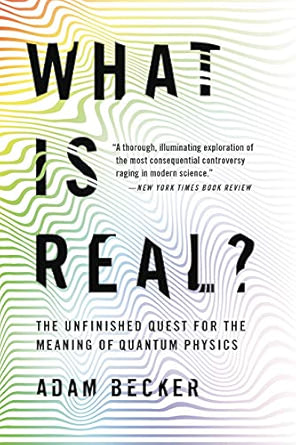More on this book
Community
Kindle Notes & Highlights
by
Adam Becker
Started reading
October 11, 2024
literature on Bohr is vast and inconclusive
intellectual atmosphere of the period itself.
Heisenberg and others were definitely influenced by Ernst Mach and his successors, the “Vienna Circle”
“logical posi...
This highlight has been truncated due to consecutive passage length restrictions.
reference to something unobservable was not only bad science, it was literally meaningless.
Thus, talking about what happens in quantum systems when nobody’s looking is nonsensical.
Pauli’s scathing put-downs were legendary, earning him the nickname “the Scourge of God.” “I do not mind if you think slowly, but I do object when you publish more quickly than you can think,”
another physicist’s paper that “it is not even wrong.”
problem of whether something one cannot know anything about exists all the same,” he said, “than about the ancient question of how many angels are able to sit on the point of a needle.”
Bohr simply dismissed the idea of a quantum world altogether. “There is no quantum world,” he said. “Isolated material particles are abstractions, their properties on the quantum theory being definable and observable only through their interaction with other systems.”
Jordan thought that “observations not only disturb what has to be measured, they produce it”—
Pauli thought that observation introduced “indeterminable effects” that disturbed the systems being observed in uncontrollable ways.
Thus, the myth that these physicists created a unified Copenhagen interpretation is just that—a myth.
all agreed that it was pointless to talk about what was “really” happening in the quantum world.
Physics concerns what we can say about nature.”
It was enough to merely describe measurable features of the world accurately, without talking about what was actually happening.
quantum physics is a mere tool,
an instrument for predicting the outcomes of measurements.
Einstein found positivism wholly uncompelling,
Berkeley’s principle, esse est percipi [to be is to be perceived].”
Einstein
His thought experiment was simple, elegant, and carefully designed to strike at the heart of this inadequacy.
Quantum physics is great at describing the aggregate behavior of large groups of particles.
can’t do more than assign probabilities;
problem is one of locality:
according to Heisenberg, Born, and Bohr, the electron itself isn’t anywhere.
probability of it hitting the film anywhere else immediately drops to zero.
avoid contradictions with relativity, particles must have determinate locations at all times, in addition to wave functions.
Einstein’s simple thought experiment offered a devastating critique of the Copenhagen position,
Einstein presented Bohr with another thought experiment,
Einstein’s thought experiment “failed” because he (Einstein) had forgotten to take his own theory of general relativity into account.
Einstein hoisted by his own petard.
the problem was with Bohr.
Bohr had once again missed the point.
Boris Podolsky and Nathan Rosen,
“Can Quantum Mechanical Description of Physical Reality Be Considered Complete?”
The thought experiment at the heart of the paper imagines a pair of particles, A and B, which collide head-on, interact in a very specific
Momentum is always conserved—
because of the way the particles interact, the distance between them at any time is easy to calculate.
quantum physics, the situation is a little trickier,
According to the Copenhagen interpretation, particles don’t have properties like position or momentum (or anything else) until those properties are measured.
EPR argued that it must be incomplete… there must be features of the world that quantum physics doesn’t account for.
made for a media frenzy,
Einstein told Schrödinger that the EPR paper “was written by Podolsky after much discussion.
that violates locality.
am therefore inclined to believe that the description of quantum mechanics in the sense of [the Copenhagen interpretation] has to be regarded as an incomplete and indirect description of reality, to be replaced at some later date by a more complete and direct one.
There has been an enormous amount of ink spilled trying to decipher Bohr’s reply to EPR; there is no clear consensus on what he meant, or whether he thought quantum physics was nonlocal.
whether Bohr himself thought the Copenhagen interpretation was nonlocal, most other physicists didn’t.
the [EPR paper] you have publicly called the dogmatic quantum mechanics to account.”
Schrödinger dubbed this connection “entanglement.”


